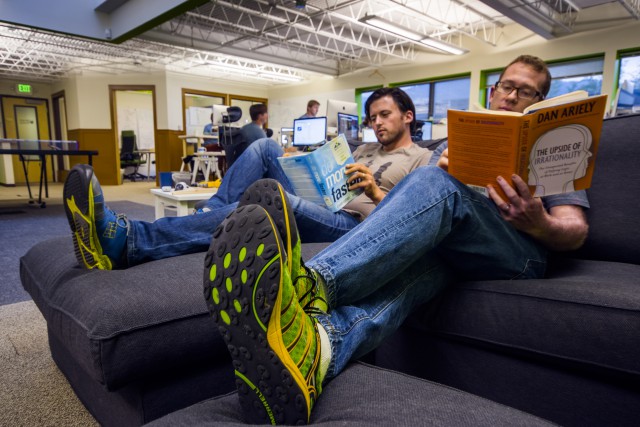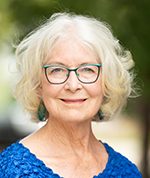
The figurative rules of the game have changed for America’s electric utilities. Gone are the days of simply providing cheap, reliable energy to the masses; under the new rules, they are tasked with persuading their customers to use their energy more efficiently as well, and it is a task they struggle to perform.
But for the Boulder-based startup Simple Energy, the key to changing people’s energy habits is to treat it like a game — literally.
In its origins, Simple Energy was intended to help utilities reach their energy efficiency goals through fancy gadgets, like a wireless thermostat that can be programmed to regulate indoor temperature and reduce energy use. But the company’s co-founders did their research before they opened their doors, and discovered that perhaps more technology wasn’t the answer. Fancy tools, they found, were already available through new energy efficiency programs — wireless thermostats, iPad-like wall displays of real-time energy use and other devices — but nobody was using them. And there seemed to be no need for another company advocating for energy efficiency: The message that reducing energy means less pollution, increased national energy security and maybe even a chance to combat climate change was already being trumpeted loud and clear.
Simply put, nobody cared.
“Really we have a motivation problem,” says Justin Segall, co-founder and vice president of Simple Energy. “There’s a fundamental disconnect between people and how they use energy.”
For Segall and co-founder Yoav Lurie, this was the “ah-ha moment” that made their startup what it is today: a company that persuades people to do the right thing for the wrong reasons. By the time Simple Energy launched in 2010, the new goal was to get people to care — or at least to act like they care — about using less energy.
The government certainly cares. According to the American Council for an Energy-Efficient Economy, in 2011 the U.S. invested nearly $6 billion in electric energy efficiency programs. Colorado alone spent $64 million. These programs have funded everything from low-cost thermostats to long-life light bulbs, even power strips to reduce a household’s “phantom load” — energy consumed by an appliance that is plugged in, even if it is off — and other devices. They have produced endless lists of “energy-saving tips” on the Internet, or stuffed them into mailboxes. Utilities have used the funding to offer free energy audits, or haul-away programs for energyguzzling refrigerators, or tax incentives to invest in more costly home retrofits like energy-efficient windows. But what could Simple Energy do to get more people to take advantage of them?
Segall and Lurie, both Duke University alums, contacted Duke behavioral economist Dan Ariely, author of The New York Times bestseller Predictably Irrational, to help crack the code of what motivates people to change their energy use habits.
“It’s probably the toughest thing to get people to care about,” Ariely says. “Maybe the toughest in the whole world.”
This is because people don’t generally see the direct effects of their excessive energy use. Most can’t see climate change progressing in their daily lives, or they assume the effects will take hold far in the future or in faraway places. They can’t imagine that their meager individual actions — like turning off lights, or replacing an aging fridge, or foregoing an AC for a small fan — would amount to more than a tiny drop in a planet-sized bucket. Ariely calls these forces a “perfect storm of apathy for energy use.”
The result is that short-term selfish motivations tend to trump long-term concerns for the environment.
And for an issue as charged as climate change, the disconnect may run as deep as a person’s sense of belonging. In a study published by Dan Kahan, Yale professor of psychology, research suggested that group identity was more influential than an individual’s scientific knowledge, when it comes to perceiving the risks of climate change. For people who identified with the “Egalitarian Humanitarian” group, the more science they learned about climate change, the more they perceived it as a threat to society. But for those in the “Hierarchical Individualist” group, the more knowledge they gained, the less they saw climate change as a risk — instead they found ways to use the new information to justify their existing view of the issue.
“The consequences for them of forming a position that’s inconsistent with the one that’s dominant in their group can be pretty high,” Kahan says. “It’s not surprising that people are going to tend toward ways of making sense of the information that will guide them to the view that’s consistent with the one in their group, and not necessarily the one that’s consistent with the evidence.”
True to its name, Simple Energy decided not to address this complex problem.
“We’re not trying to necessarily get everybody to care about energy,” Segall says.
“But how do we get them to act as if they care about energy by tapping into something that they do care about?”
Answer: the “gamification” of energy use. Who doesn’t love a little friendly competition?
Here’s how it can look to a consumer. Utilities that partner with Simple Energy will email you personalized information about your own home energy use, as well as how it compares to the neighbors’ usage. Subtle competition is introduced: If you use less and save more than your neighbors, you can earn a prize. There is a prompt to click through to the Simple Energy platform (although it will look like just another section of the utility’s website), log into your personal household energy profile and see what you can win. Your personal dashboard will also show who’s currently on the “leader board” of top local energy savers — and invite you to “click here” to find out how you can make it to the leader board yourself. Interested in more energy-saving tips (because it might help you to win this game)? Click here. Or do you want to help your neighborhood beat other neighborhoods at saving energy? Click here to start a share tips that helped you earn rewards with your friends? Click here to share your status. There are any number of ways to play the game.
Although these incentives are not “natural” reasons to care about being energy efficient, the end result is that people behave as if they care, and use less energy.
“The notion of getting people to do the right thing for the wrong reason is to basically get people to say, ‘It’s not because I think about global warming,’” Ariely says. “But because I think this is what a good person does, or it gives me satisfaction right now, or I feel better about myself.”
For the moment, Simple Energy has no programs in Boulder, as city officials continue to weigh whether to sever ties with Xcel Energy, the private utility serving the Boulder market, and create a municipal electric utility that will meet public demand for cleaner energy at comparable rates. Although Segall says he would love to work in his own backyard, Boulder residents would seem to be among those who already care about energy for the “right” reasons.
Meanwhile Simple Energy is drawing other customers nationwide into the energy saving game, even if it’s just for the love of the game. But the environment is winning: By the end of next year, Simple Energy hopes to have saved more than 250 gigawatt hours of electricity.
Respond: [email protected]














